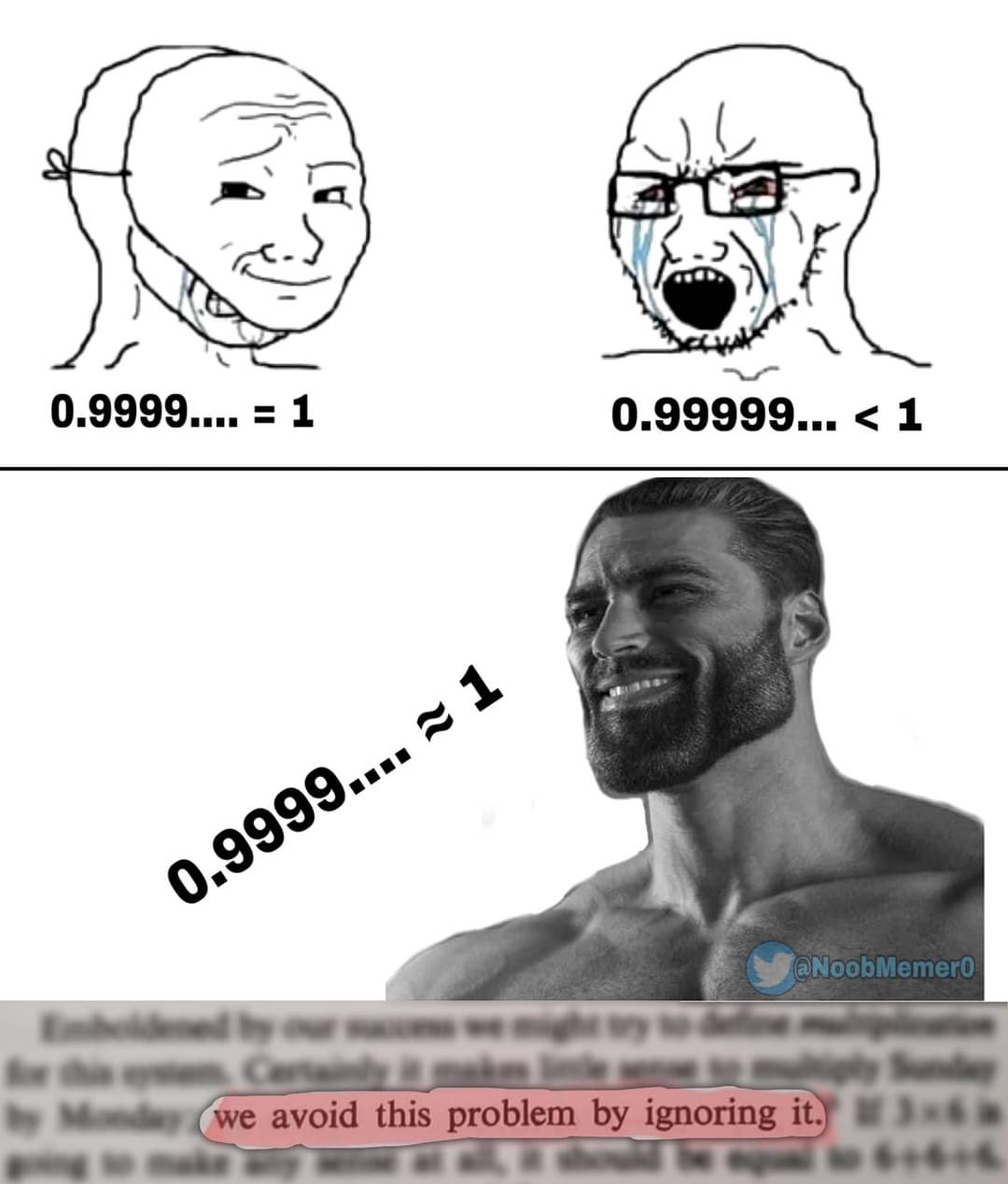this post was submitted on 27 Jun 2024
792 points (95.1% liked)
Science Memes
11161 readers
1699 users here now
Welcome to c/science_memes @ Mander.xyz!
A place for majestic STEMLORD peacocking, as well as memes about the realities of working in a lab.

Rules
- Don't throw mud. Behave like an intellectual and remember the human.
- Keep it rooted (on topic).
- No spam.
- Infographics welcome, get schooled.
This is a science community. We use the Dawkins definition of meme.
Research Committee
Other Mander Communities
Science and Research
Biology and Life Sciences
- !abiogenesis@mander.xyz
- !animal-behavior@mander.xyz
- !anthropology@mander.xyz
- !arachnology@mander.xyz
- !balconygardening@slrpnk.net
- !biodiversity@mander.xyz
- !biology@mander.xyz
- !biophysics@mander.xyz
- !botany@mander.xyz
- !ecology@mander.xyz
- !entomology@mander.xyz
- !fermentation@mander.xyz
- !herpetology@mander.xyz
- !houseplants@mander.xyz
- !medicine@mander.xyz
- !microscopy@mander.xyz
- !mycology@mander.xyz
- !nudibranchs@mander.xyz
- !nutrition@mander.xyz
- !palaeoecology@mander.xyz
- !palaeontology@mander.xyz
- !photosynthesis@mander.xyz
- !plantid@mander.xyz
- !plants@mander.xyz
- !reptiles and amphibians@mander.xyz
Physical Sciences
- !astronomy@mander.xyz
- !chemistry@mander.xyz
- !earthscience@mander.xyz
- !geography@mander.xyz
- !geospatial@mander.xyz
- !nuclear@mander.xyz
- !physics@mander.xyz
- !quantum-computing@mander.xyz
- !spectroscopy@mander.xyz
Humanities and Social Sciences
Practical and Applied Sciences
- !exercise-and sports-science@mander.xyz
- !gardening@mander.xyz
- !self sufficiency@mander.xyz
- !soilscience@slrpnk.net
- !terrariums@mander.xyz
- !timelapse@mander.xyz
Memes
Miscellaneous
founded 2 years ago
MODERATORS
you are viewing a single comment's thread
view the rest of the comments
view the rest of the comments

you're thinking about this backwards: the decimal notation isn't something that's natural, it's just a way to represent numbers that we invented. 0.333... = 1/3 because that's the way we decided to represent 1/3 in decimals. the problem here isn't that 1 cannot be divided by 3 at all, it's that 10 cannot be divided by 3 and give a whole number. and because we use the decimal system, we have to notate it using infinite repeating numbers but that doesn't change the value of 1/3 or 10/3.
different bases don't change the values either. 12 can be divided by 3 and give a whole number, so we don't need infinite digits. but both 0.333... in decimal and 0.4 in base12 are still 1/3.
there's no need to change the base. we know a third of one is a third and three thirds is one. how you notate it doesn't change this at all.
I'm not saying that math works differently is different bases, I'm using different bases exactly because the values don't change. Using different bases restates the equation without using repeating decimals, thus sidestepping the flaw altogether.
My whole point here is that the decimal system is flawed. It's still useful, but trying to claim it is perfect leads to a conflict with reality. All models are wrong, but some are useful.
you said 1/3 ≠ 0.333... which is false. it is exactly equal. there's no flaw; it's a restriction in notation that is not unique to the decimal system. there's no "conflict with reality", whatever that means. this just sounds like not being able to wrap your head around the concept. but that doesn't make it a flaw.
Let me restate: I am of the opinion that repeating decimals are imperfect representations of the values we use them to represent. This imperfection only matters in the case of 0.999... , but I still consider it a flaw.
I am also of the opinion that focusing on this flaw rather than the incorrectness of the person using it is a better method of teaching.
I accept that 1/3 is exactly equal to the value typically represented by 0.333... , however I do not agree that 0.333... is a perfect representation of that value. That is what I mean by 1/3 ≠ 0.333... , that repeating decimal is not exactly equal to that value.